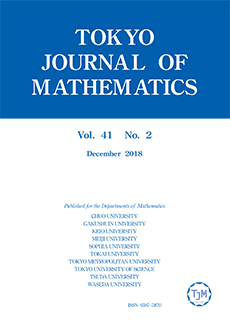Abstract
Let $(a,b,c)$ be a primitive Pythagorean triple. In 1956, Jeśmanowicz conjectured that the equation $a^{x}+b^{y}=c^{z}$ has the unique solution $(x,y,z)=(2,2,2)$ in positive integers. In 2010 Miyazaki proposed a similar problem. He conjectured that if $(a,b,c)$ is again a primitive Pythagorean triple with $b$ even, then the equation $c^{x}+b^{y}=a^{z}$ with $x$, $y$ and $z$ positive integers has the unique solution $(x,y,z)=(1,1,2)$ if $c=b+1$ and no solutions if $c>b+1$. He also proved that his conjecture is true if $c \equiv 1 \pmod{b}$. We extend Miyazaki's result to the case $c \equiv 1 \pmod{b/2^{\textrm{ord}_{2}(b)}}$.
Citation
Zsolt RÁBAI. "A Note on the Shuffle Variant of Jeśmanowicz' Conjecture." Tokyo J. Math. 40 (1) 153 - 163, June 2017. https://doi.org/10.3836/tjm/1502179220





